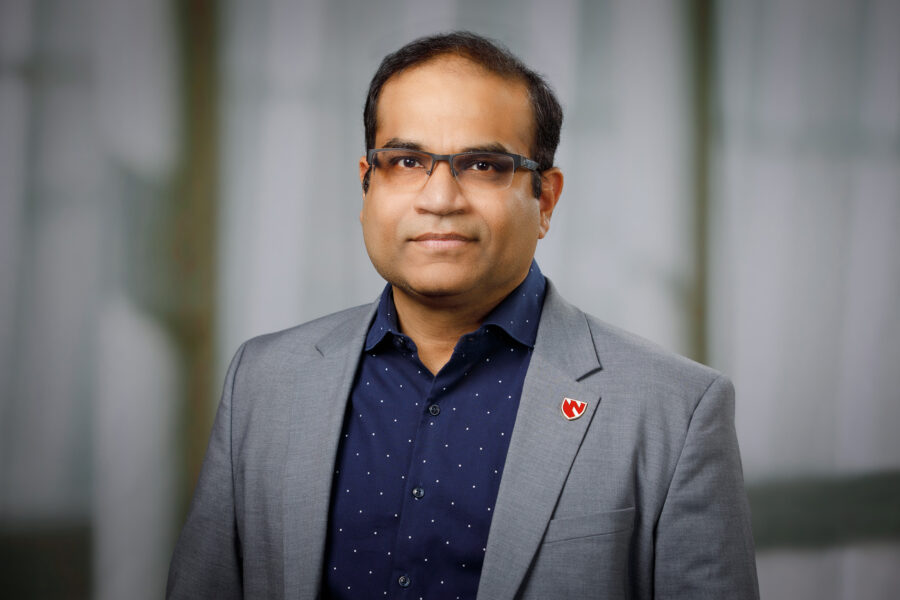This profile is part of a series to highlight the researchers and leaders who will be honored at a ceremony on Nov. 6 for UNMC’s annual research awards – the prestigious Scientist Laureate Award and the Research Leadership, Distinguished Scientist, New Investigator, Career Achievement and Community Service to Research Awards.
Distinguished Scientist
Distinguished Scientist Awards, which are sponsored by the chancellor, recognize researchers who have been among the most productive scientists at UNMC during the past five years.
- Name: Gurudutt Pendyala, PhD
- Title: Professor of anesthesiology and Robert Lieberman Endowed Professor of Pain Medicine, Department of Anesthesiology, UNMC College of Medicine
- Joined UNMC: 2008
- Hometown: Secunderabad, Telangana, India
Describe your research focus in three words or less:
Addiction, neurodevelopment and infectious diseases.
Why is research important in the world today?
From pandemics to AI, research replaces guesswork with data driven insights. It’s that wonder tool that turns “hmm” into “wow!” and mostly “Oops!” On a lighter note, maybe that explains why scientists and graphs often break up, because there’s no “significant” relationship. Despite these failures, scientists persist knowing “every setback is a set up for a comeback.” That resilience and optimism make research always “statistically awesome.” Scientists truly RISE – through Research, Innovation, Science and Education – powering breakthroughs and expanding knowledge.
My research will make a difference because:
“Addiction doesn’t knock on the door — it breaks it down, and the whole family feels the impact.” My research program focuses on the neurobiology of addiction, exploring molecular mechanisms that drive substance use disorders. We integrate cutting-edge technologies, translational models and collaborative partnerships in the quest to identify biomarkers and therapeutic targets that can transform addiction treatment. I remind myself daily this work isn’t just cracking a molecular code but paving a path towards deeper understanding, informing clinical strategies and shaping public health policies. And what better way to pay it forward than mentoring future scientific leaders, teaching them that their respective research isn’t just knowledge – it’s hope for patients and families.
The best advice I’ve ever received is:
From my mother, now retired after teaching high school for 33 years. “Academic success doesn’t follow a clock. Some bloom early, others later — but each has a light worth waiting. Be that mentor who sees the spark before the world does.”
Three things you may not know about me are:
- I am an avid calligrapher who tries to complement my inner scientist finding nuance in every pen stroke or precision in data points.
- I have a knack for acronyms – be it scientific or for fun.
- I’m married to a fellow faculty member — who also happens to be a former Distinguished Scientist awardee. As scientist spouses, our lab meetings aren’t romantic getaways – skip the candles, embrace the critique.

Congratulations Guru.
Congrats, Guru!
Congratulations! I can’t think of anyone more deserving of this award!
Congratulations on this wonderful honor!
Congratulations on your distinguished scientist award
Congratulations Dr. P! I am so honored to work in your lab.
Congratulations!
Congratulations!
Congratulations!!
Heartiest congratulations !!
Thank you for your warm wishes.
Wow Guru ! Hearty congrats !! So enjoyed reading your perspectives, the humor, the wit, the acronyms and your moms wisdom 💕 I need a token if your calligraphic skills please
So happy for you all👏👏👏
Congratulations Guru. Your award is a testament to the importance and priority being placed on prevention, assessment and treatment of substance use disorders. And more importantly to you as such a talented researcher. Thanks for working to give us better tools to help our patients and their families!
Congratulations, Guru!